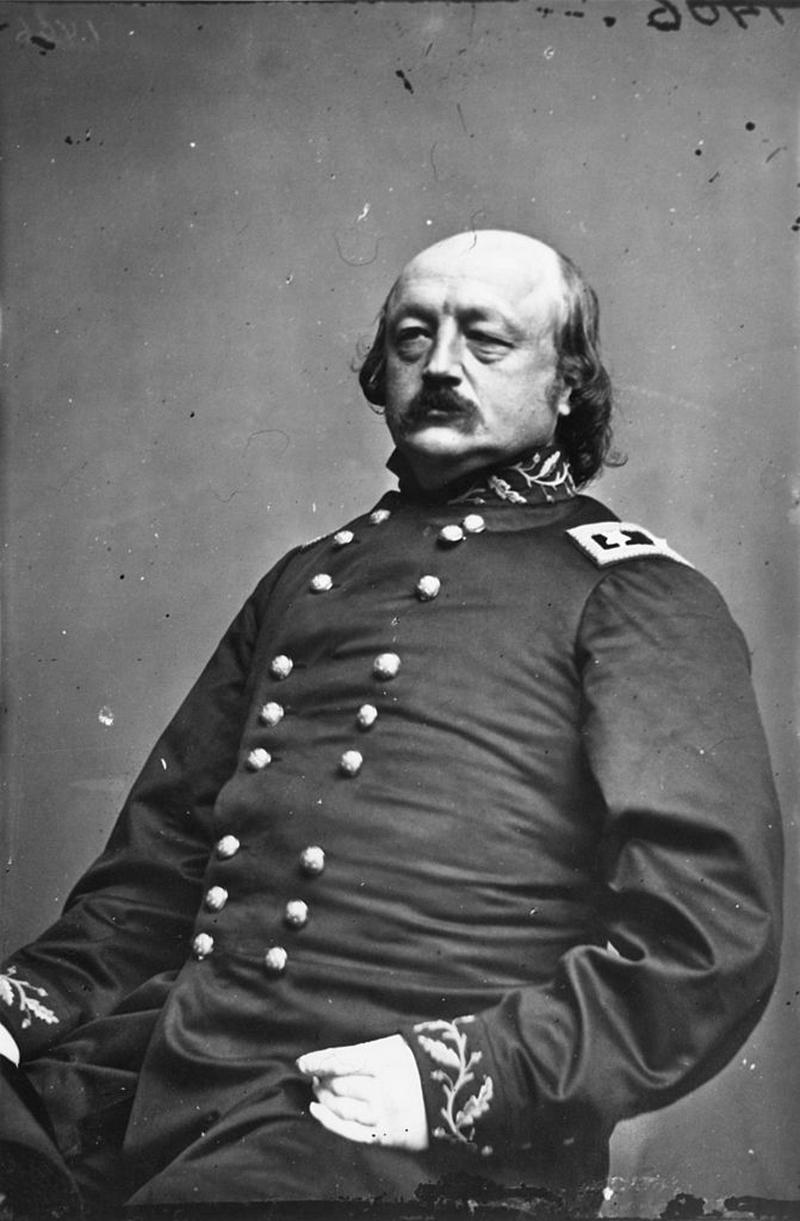Ben ‘Beast’ Butler, the Woman’s Order, and a “Common Enemy of Mankind”
By Karen Harris | December 21, 2022

On this day in history, December 23, 1862, Jefferson Davis, the president of the Confederacy, declared Union General Ben ‘Beast’ Butler to be a “felon, outlaw, and common enemy of mankind.” This was in the midst of the Civil War and Davis and Butler were on opposite sides, so that accounts for some of Davis’s hatred of Butler, but was there more going on that made Butler an “enemy of mankind”? You betcha!
Who Was Ben Butler?
Benjamin Franklin Butler was a lawyer and businessman from Massachusetts. He served five terms in the U.S. House of Representatives and even ran unsuccessfully for the governorship of Massachusetts. Despite his strong political presence, Butler was a controversial figure who often butted heads with members of his own political party.
When the Civil War broke out, Butler saw it as an opportunity to pad his resume … and his pocketbook. He lacked military training and experience, but nonetheless he relied on his political clout and connections to be appointed to the position of brigadier general of the Massachusetts militia. He and his troops were ordered to a spot outside Baltimore. Almost immediately, Butler’s activities and inactions raised some red flags. He conducted unauthorized activities, ignored military protocol, and was impertinent and insubordinate to his superiors. He was almost dismissed from the Union Army at this point, but President Abraham Lincoln knew that Butler had a loyal following of key people in the North. Instead of canning him, Lincoln gave Butler a promotion to major general and sent him to lead the campaign to capture New Orleans.

Butler in New Orleans
Ben Butler, now a major general, thought he would be able to add ‘war hero’ to his resume by capturing the important port city of New Orleans. However, Butler had no hand in the capture of New Orleans. That honor went to Admiral David Farragut of the Union Navy. But a few days later, Ben Butler was named the military governor of New Orleans, the largest city in the South. From day one, he acted arrogant and superior to the citizens of New Orleans. He walked from the docks into the city with a drum corps playing “Yankee Doodle” behind him.
As the military governor, he engaged in numerous controversial business and financial dealings that served his own personal benefit. He was less interested in winning over the citizens, ensuring the city was prospering, and keeping the Confederates from retaining the city. He was more interested in finding ways to profit from his position.

Butler the Beast
Ben Butler was an unfortunate-looking man with a face that was rather bulldog-like. He was large, paunchy, and unkempt. He also thrived on conflict, was often rude and unnecessarily aggressive, and had foul breath. The people of New Orleans started calling him ‘the Beast’, an unflattering nickname that fit him well.
As you can see, Ben Butler was gross, unpleasant, and unpopular, but this can’t be the only reason why Jefferson Davis called him a “common enemy of mankind.” Nope, this was just the start. It was Butler’s “Woman’s Order” that sealed the deal for Davis and others.

Butler’s “Woman’s Order”
Under Butler’s rule of New Orleans, Union soldiers patrolled the Southern city. Naturally, the citizens of New Orleans – mostly women, children, and the elderly since able-bodied men were off fighting in the war – hated to see enemy soldiers parading through their streets. Women frequently took out their hatred on Butler’s men. They verbally assaulted them, spat on them, slapped them, and even waited in their upstairs windows for soldiers to pass by so they could dump their chamber pots on them. Admiral Farragut was on the receiving end of one of these chamber pots. No man would dare strike a woman, especially in public, so the assaults on the Union troops went unchecked until Ben ‘the Beast’ Butler announced his General Orders No. 28, which became known as the “Woman’s Order”, on May 15, 1862.
Under the “Woman’s Order,” Butler declared that if a ‘lady’ of New Orleans accosted a Union soldier, she would be arrested, charged, and treated like a common prostitute. The good people of the South were shocked. Even the British House of Lords called Butler’s order, “one of the grossest, most brutal, and most unmanly insults to every woman in New Orleans.” Butler didn’t care. When Admiral Farragut asked Butler how he planned to enforce the “Woman’s Order,” Butler responded that it would “execute itself.” He was right. Just knowing that they could be arrested and charged with prostitution was enough to deter the women of New Orleans from further attacks on Union soldiers.
Butler Gets the Boot
Ben ‘the Beast’ Butler’s questionable business dealings, his ineptness at military leadership, his all-around unpleasantness, and his shocking “Woman’s Order” were all factors in his ousting as the military governor of New Orleans after only eight months. He was officially recalled from New Orleans on December 23, 1862. Although he was replaced by another Union officer, all of New Orleans and the South were thrilled to see the Beast get booted out of the city. So, when Confederate President Jefferson Davis called Ben Butler a “felon, outlaw, and common enemy of mankind,” it wasn’t just trash-talking the enemy. It was a personal commentary of a brutish man.